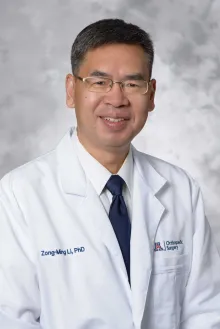Zong-Ming Li named medical biological engineering fellow
The International Academy of Medical and Biological Engineering has elected Zong-Ming Li, PhD, a professor at the University of Arizona College of Medicine – Tucson and associate director for the U of A Arthritis Center, to its class of 2024 Fellows.

Zong-Ming Li, PhD
Li, the William and Sylvia Rubin Endowed Chair in Orthopaedic Research, is a full professor in the College of Medicine – Tucson departments of orthopaedic surgery and biomedical engineering and serves as vice chair for research in the department of orthopaedic surgery.
“Being named to the 2024 class of the International Academy of Medical Biological Engineers is an incredible honor,” said Li, who is also the director of the Robert G. Volz, MD, Orthopaedic Research Laboratory and the Hand Research Laboratory. “It is a recognition from our peers and leaders in the field of biomedical engineering, showing the impact and importance of our work. It is a testament to the dedication, innovation and collaboration that underpin our efforts to improve health care outcomes through engineering solutions.”
Li’s research focuses on bioengineering studies of the hand, with clinical applications for carpal tunnel syndrome and wrist osteoarthritis.
“Over the past two decades, my team and I have worked on hand biomechanics and discovered a mechanism of carpal arch space augmentation that nonsurgically expands the carpal tunnel to relieve symptoms of carpal tunnel syndrome,” said Li, who has been at the U of A for five years.
C. Kent Kwoh, MD, MACR, director of the U of A Arthritis Center, a professor at the College of Medicine – Tucson and the Charles A.L. and Suzanne M. Stephens Endowed Chair in Rheumatology, said, “Dr. Li has made significant contributions to the field of biomedical engineering while making novel advancements in the research of carpal tunnel syndrome and hand osteoarthritis.
“He continues to be an innovative leader in orthopaedic bioengineering in addition to serving as a dedicated mentor to current and future engineers and clinicians. We are fortunate to have recruited him to the U of A.”
Li has more than 30 years of experience in musculoskeletal research and education. Prior to coming to the College of Medicine – Tucson, Li was a professor at the Cleveland Clinic Lerner College of Medicine within the Case Western Reserve University School of Medicine. He earned his PhD from Pennsylvania State University in 1998.
“The support from the University of Arizona College of Medicine – Tucson and the U of A Health Sciences has been instrumental in our research and my professional growth,” said Li. “They have provided essential resources, funding and a collaborative environment that has enabled me and my team members to pursue innovative projects.”
According to its website, IAMBE is made up of Fellows who are recognized for their outstanding contributions to the profession of medical and biological engineering. Election to the academy is initiated by nominations, which are screened by a membership committee, and the election is conducted by a vote of all Fellows of the Academy. The IAMBE is affiliated with the International Federation for Medical and Biological Engineering.

